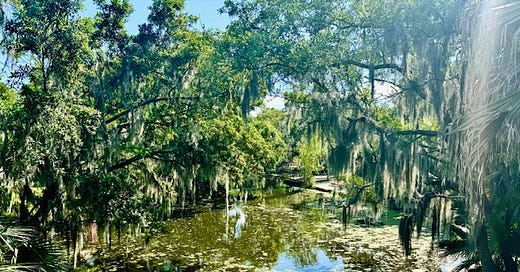The Girl and Her City
New Orleans was her oldest friend, her fiercest protector, and her occasional disciplinarian
There was once a girl born beneath the heavy-lidded gaze of Spanish moss and the lullaby hum of cicadas. Her cradle rocked to the rhythm of second lines and distant thunder. The city of New Orleans didn’t just raise her, it claimed her.
New Orleans was her oldest friend, her fiercest protector, and her occasional disciplinarian. She whispered secrets through alleyways slick with history and hummed lullabies through the rusted notes of a trumpet echoing off brick courtyards. The girl didn’t just live in New Orleans. She belonged to her.
The oak trees were the first to teach her about embrace. Their arms, heavy and low, wrapped around her shoulders when she felt small. They wore resurrection ferns like proud accessories and reminded her that you could still be beautiful even after you’d fallen apart and come back again.
Every evening, as dusk turned the sky to burnt sugar and bruised lilac, the scent of jasmine would trail behind her like a veil. She didn’t wear perfume. She was perfume. New Orleans had dabbed her temples with it like a mother sending her child out into the world with grace stitched into her skin.
When the girl made mistakes, as all daughters do, it was the Mississippi who scolded her. The river didn’t use words. It used warnings. She'd watch it swell after a storm, its muddy belly rising with reproach. “Child,” it would seem to say, “don’t forget the power that flows through you. But don’t forget mine, either.”
Bourbon Street was the wild cousin who led her astray, and Royal Street was the older sister who picked her up in the morning, dusted off her dignity, and reminded her of who she was. The streetcars always waited patiently for her return, their bells like soft laughter saying, “I knew you’d be back.”
She learned to dance barefoot in Jackson Square, with cathedral bells ringing above her like blessings, and to cry beneath the rain-slick statues of saints who had seen it all before. Her tears weren’t lonely here. They were welcomed, turned into poetry, and poured into the cracks of the sidewalks.
The city didn’t judge her heartbreak. It just poured her a strong drink and played her a song that hurt in the right way. New Orleans taught her that grief could sit beside joy at the same dinner table and still leave room for dessert.
And when she felt lost, when the world outside spun too fast or forgot her name, New Orleans leaned in close, all breath and brass, and whispered:
“You are mine, baby girl. And I am yours.”
Because this was no ordinary city.
This was her best friend, her matriarch, her mirror.
This was New Orleans. And the love between them was a song too old to forget.





